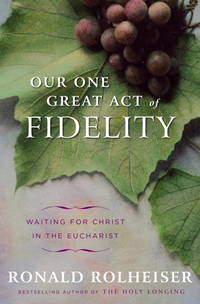From the publisher
From the author of the bestselling, The Holy Longing, comes a book about the central expression of faith for hundreds of millions of Christians, the Eucharist.
More so than anything else, the Eucharist is what anchors many peoples' life, prayer, and ultimately the way they live their lives. In this deeply personal book, Father Ronald Rolheiser delves into the history and meaning of this sacred tradition, drawing upon the insights of various scripture scholars, theologians, and church teachings. With personal warmth and great insight, he reflects on his own particular Roman Catholic upbringing and the centrality that the Eucharist has within that tradition. At the same time, he looks at other denominations' traditions around the Eucharist. Our One Great Act of Fidelity is an investigation into the ways people secure their faith and belief and discover true intimacy with God and each other. Ultimately, however, it is a spiritual and a personal statement of how Ronald Rolheiser understands the Eucharist and why he celebrates it every day.
Ronald Rolheiser is a specialist in the field of spirituality and is currently President of the Oblate School of Theology in San Antonio, Texas. Father Rolheiser is the author of The Holy Longing, The Restless Heart, Forgotten Among the Lilies, The Shattered Lantern, and Against an Infinite Horizon. He writes a weekly column that appears in more than 90 Catholic publications. More information on his work can be found at RonRolheiser.com.
Details
-
Title
Our One Great Act of Fidelity: Waiting for Christ in the Eucharist
-
Author
Ronald Rolheiser
-
Binding
Hardback
-
Edition
First Edition
-
Pages
139
-
Language
EN
-
Publisher
The Doubleday Religious Publishing Group, Westminster, MD, U.S.A.
-
Date
2011-06-14
-
ISBN
9780307887030
Excerpt
chapter 1
The INCARNATION and
the BODY of CHRIST
A story that is familiar to many of us tells of a young girl who woke up one night frightened and disoriented, convinced that there were spooks and monsters around her in the darkness of her room. She ran to her parents' bedroom for safety. Her mother brought her back to her own room, put on a light to show her that there was nothing there, and gently tried to reassure her that she was safe. Then, just before leaving, the mother said to her, "You don't need to be afraid. You aren't alone. God is here in the room with you." The child replied, "I know that God is here with me, but I need someone here who has some skin!"
We are all like that little girl. As human beings we are sensual creatures in the true meaning of that term. We are creatures of the senses: touch, sight, hearing, smell, and taste. Everything that enters us goes through one of those five senses and everything that comes out of us, all communication and expression, comes out through one of those same senses. We are not angels, pure spirits without bodies. We are incarnate spirits, souls that have a body, and so we need things that we can touch, see, hear, taste, and smell.
That is true, too, sometimes especially so, in terms of our relationship to God. A God who is everywhere is, for us, at a certain point, nowhere. We are human. We need a God who has some skin, who can be located, who can somehow be physically touched. And God--who knows human nature, since he created it--respects that need in us and meets us on our own terms. Thus, the central tenet within Christianity, the very thing that defines it, is the belief that, in Christ, God took on concrete flesh and became tangible, physical, someone who can touch and be touched. Indeed the very word Christ ultimately means divine reality inside of human flesh.
When John wrote his Gospel, he did not include a Christmas story. In place of the birth of Jesus, he simply wrote, The word was made flesh and it lives among us. That single statement defines Christianity. Christianity isn't first and foremost a religion or a set of beliefs. Rather, parallel to the unfolding of the universe itself, it is an ongoing story, the story of God taking on physical flesh in this world, a story that began with the birth of Jesus in Bethlehem and that continues down to this very day. God is still taking on concrete flesh. How?
The mystery of God taking on concrete flesh, which Christians call the incarnation, isn't a simple thirty--three--year incursion of God into human history in the person of Jesus. It's more. God took on flesh in Jesus, but the incarnation didn't end when Jesus ascended back to the Father after his resurrection. The incarnation is still going on. God is still taking on concrete flesh in this world. Where?
In the Christian scriptures, the term the body of Christ is used to refer equally to three things: the historical body of Jesus, the body of believers, and the Eucharist. Each of these is referred to as the body of Christ. Each is the body of Christ. For instance, when Saint Paul refers to either the community of believers or the Eucharist, he never intimates that they are like Jesus, that they replace Jesus, that they are symbolic representations of Jesus, or even that they are a mystical presence of Jesus. Each is equally called the body of Christ, each is that place in our world where God takes on concrete flesh. God still has skin in this world, in the Eucharist and in the community of believers. The incarnation is still going on. The word is still becoming flesh and living among us.
That is the first, and the key, thing that must be said about the Eucharist. Along with the community of believers, the Eucharist is God's physical presence, God's real presence in the world. The Eucharist is the place where God continues to take concrete physical flesh just as he once did in the womb of Mary. In the Eucharist, the word continues to become flesh.
2
The CENTRALITY of the EUCHARIST
to the CHRISTIAN FAITH
Jesus didn't leave us a lot of rituals. He left us his Word1 and he left us one ritual, the Eucharist. He refers to other rituals such as baptism, and other parts of the Christian scriptures refer to the laying on of hands, to the confessing of sins, and to various kinds of anointing with oil, but Jesus, himself, left us only his Word and the Eucharist.
And it is around these two things, the Word and the Eucharist, that we form community; from these we create church. Historically Roman Catholics and Protestants have differed as to which of these to give the priority. In classical Protestant theology and practice, the Word is central; it is what first and foremost draws us into community. Eucharist might or might not follow. In Roman Catholicism, the Eucharist is given priority and the Word and all the other sacraments are ultimately in support of the Eucharist.2 In a vast oversimplification, it might be said that Roman Catholics form church around the Eucharist, while seeing the Word as a necessary prelude to and supplement to the Eucharist; whereas Protestants form church around the Word, while seeing the Eucharist as flowing out from that in different ways.
Partly this can be seen simply by walking into either a Roman Catholic or a Protestant church. When you walk into
a Protestant church, what is front and center? A pulpit or a lectern, something from which the Word of God is proclaimed and preached. Secondarily there might or might not be an altar, and if there is one, it is generally less centrally situated. The architecture speaks the theology: we gather first and foremost around the Word. The Eucharist takes a secondary place. When you walk into a Roman Catholic church the reverse is true: What is front and center? An altar. Off to one side, far less prominently, is placed a pulpit or a lectern. The message is also clear in the architecture: we gather first and foremost around the Eucharist, and the Word takes second place.
Biblical scholars suggest that this kind of division may have existed already at the time when the Gospels were written. Already then there were major variations among the different communities as to how often the Eucharist was celebrated and what its exact role was in bringing the community together. In either case, however, it was still deemed to be central, the summit to which we are called. Augustine, perhaps the most influential Christian theologian of all time, puts it this way: Jesus didn't leave us the church and from the church we derive the Eucharist; rather, for him, Jesus left us the Eucharist and from the Eucharist we derive the church. The church is in service of the Eucharist, not vice versa. Heaven will be a banquet table. The Eucharist already is that table. Because of this, Roman Catholics teach that the Eucharist is the source and the summit of all Christian life. However, because it is both source and summit, it gives a mixed message: it is both the sign of our unity and a means of coming to that unity. It is both the end to which all Christians are journeying and, at least partially, the means to get there. This double meaning has been the source of much, and sometimes bitter, debate among the churches in regard to the practice of intercommunion.
3
The RADICAL, SHOCKING, RAW, PHYSICAL CHARACTER
of the EUCHARIST
A few years ago Brenda Peterson wrote a book of essays titled Nature and Other Mothers.3 Her first entry is wonderfully named In Praise of Skin. In it, she tells how at one point in her life she was afflicted by painful skin rashes. Like the woman with the hemorrhage in the Gospels, she tried every possible doctor, but found no cure. Medication after medication proved ineffective, and eventually the doctors ran out of things to try. The rash always came back.
One day her grandmother assessed her and pronounced a more ancient and accurate diagnosis: "Skin needs to be touched!" Her grandmother then began to give her regular skin massages, and these did what the more sophisticated medicines couldn't do. They cured her.
Peterson's grandmother is right: Skin needs to be touched!
God knows that better than anyone. It's why Jesus gave us the Eucharist. In the Eucharist skin gets touched. The Eucharist isn't abstract, a theological instruction, a creed, a moral precept, a philosophy, or even just an intimate word. It's bodily, an embrace, a kiss, something shockingly physical, the real presence in a deeper way than even the old metaphysics imagined.
For whatever reasons, we tend to shy away from admitting how radically physical the Eucharist actually is. Saint Paul didn't share that fear. For him, the physical communion that takes place in the Eucharist, between us and Christ as well as among ourselves, is as real and radical as sexual union. For example, he argues against sex outside of marriage by saying that our union with Christ and each other in the Body of Christ is so intimate and real that, in effect, we would prostitute that Body if we were to have illicit sex. Strong words, but they are predicated on a very earthy conception of the Eucharist.
The early church followed Paul on this. They understood the Eucharist as so real, so physical, and so intimate that they surrounded it with the same taboos of privacy, reverence, and reticence that we reserve for sexual intimacy. For some centuries the early church had a practice (still partially followed in
some present--day church programs) that it called the Disci-plina Arcani. The discipline tried to guarantee that nobody who was not baptized or fully initiated into the community could participate in the Eucharist (beyond the liturgy of the Word). As well, Christians who were fully initiated were forbidden to speak to outsiders about the Eucharist. The intent of the discipline was not to create a mystique around the Eucharist so as to draw people to it through curiosity. Rather the idea was that the Eucharist is so intimate an act that propriety, respect, and reverence demand non--exhibitionism: you don't make love in public, and you don't talk to outsiders about this kind of intimacy.
We tend to shy away from that kind of talk. Partly that's understandable. It's hard to be comfortable religiously with how Christianity understands the physical and the bodily.
Christianity is without doubt the earthiest of all religions.4 Unlike most other religions, it doesn't call you out of the physical, out of the body, or out of the world. Rather it tells you that God enters the physical, becomes one with it, blesses it, redeems it, and that there is no reason to escape from it.
Something in that goes against the grain. Christ's relationship to the physical scandalized his contemporaries. "This is intolerable language!" is what the crowds said when Jesus spoke of the physical character of the Eucharist in John's Gospel, and the raw physical character of the Eucharist is still hard for us to accept today. But it's also a wonderful part of Christianity. In the Eucharist, our skin gets touched.
And, given our tensions and loneliness, we need that touch frequently, daily even. The late essayist and novelist Andre Dubus once wrote a wonderful little apologia on why he went to Eucharist regularly, despite the eyebrows that were sometimes raised in the circles he moved in. Here are his words:
This morning I received the sacrament I still believe in: at seven-- fifteen the priest elevated the host, then the chalice, and spoke the words of the ritual, and the bread became flesh, the wine became blood, and minutes later I placed on my tongue the taste of forgiveness and of love that affirmed, perhaps celebrated, my being alive, my being mortal. This has nothing to do with immortality, with eternity; I love the earth too much to contemplate a life apart from it, although I believe in that life. No, this has to do with mortality and the touch of flesh, and my belief in the sacrament of the Eucharist is simple: without touch, God is a monologue, an idea, a philosophy; he must touch and be touched, the tongue on flesh, and that touch is the result of the monologues, the idea, the philosophies which led to faith; but in the instant of the touch there is no place for thinking, for talking, the silent touch affirms all that, and goes deeper: it affirms the mysteries of love and mortality.5
The Eucharist is physical, real, shockingly so.
part two
The MANY DIMENSIONS
of the EUCHARIST
Christians argue a lot about the Eucharist. What does it mean? What should it be called? How often should it be celebrated? Who should be allowed to participate fully?
There are lots of views on the Eucharist. For some it is a meal, for others it is a sacrifice. For some it is a ritual act, sacred and set apart, for others it is a community gathering, the more mess and kids the better. For some it is a deep personal prayer, for others it is a communal worship for the world. For some its very essence is a coming together, a communion, of those united in a single denominational faith, while for others part of its essence is its reaching out, given that it contains an innate imperative to wash the feet of those who are different from ourselves. For some it is a celebration of sorrow, a making present of Christ's suffering, the place where we can break down, for others it is the place to celebrate joy and sing alleluia. For some it is a ritual remembrance, a bringing into the present of the historical events of Jesus' dying, rising, ascending, and sending the Holy Spirit, for others it is a celebration of God's presence with us today. For some it is a celebration of the Last Supper, something to be done less frequently, for others it is God's daily feeding of his people with a new manna, Christ's body, and is something to be done every day. For some it is a celebration of reconciliation, a ritual that forgives and unites, for others unity and reconciliation are preconditions for its proper celebration. For some it is a vigil act, a gathering that is essentially about waiting for something else or someone else to appear, for others it is a celebration of something that is already present and is asking to be received and recognized. For some it is understood to make present the real, physical body of Christ, for others it is understood to make Christ present in a real but spiritual way. Some call it the Lord's Supper, some call it the Eucharist, some call it the Mass. Some celebrate it once a year, some celebrate it four times a year, some celebrate it every Sunday, and some celebrate it every day. Who's right?
About the author
RONALD ROLHEISER, O.M.I., a Roman Catholic priest and member of the Missionary Oblates of Mary Immaculate, is president of the Oblate School of Theology in San Antonio, Texas, and the author of the books The Holy Longing, Sacred Fire, The Restless Heart, Forgotten Among the Lilies, The Shattered Lantern, and Against An Infinite Horizon. He is a community-builder, lecturer and writer, and his weekly column appears in more than 90 Catholic publications. More information on his work can be found at ronrolheiser.com.











